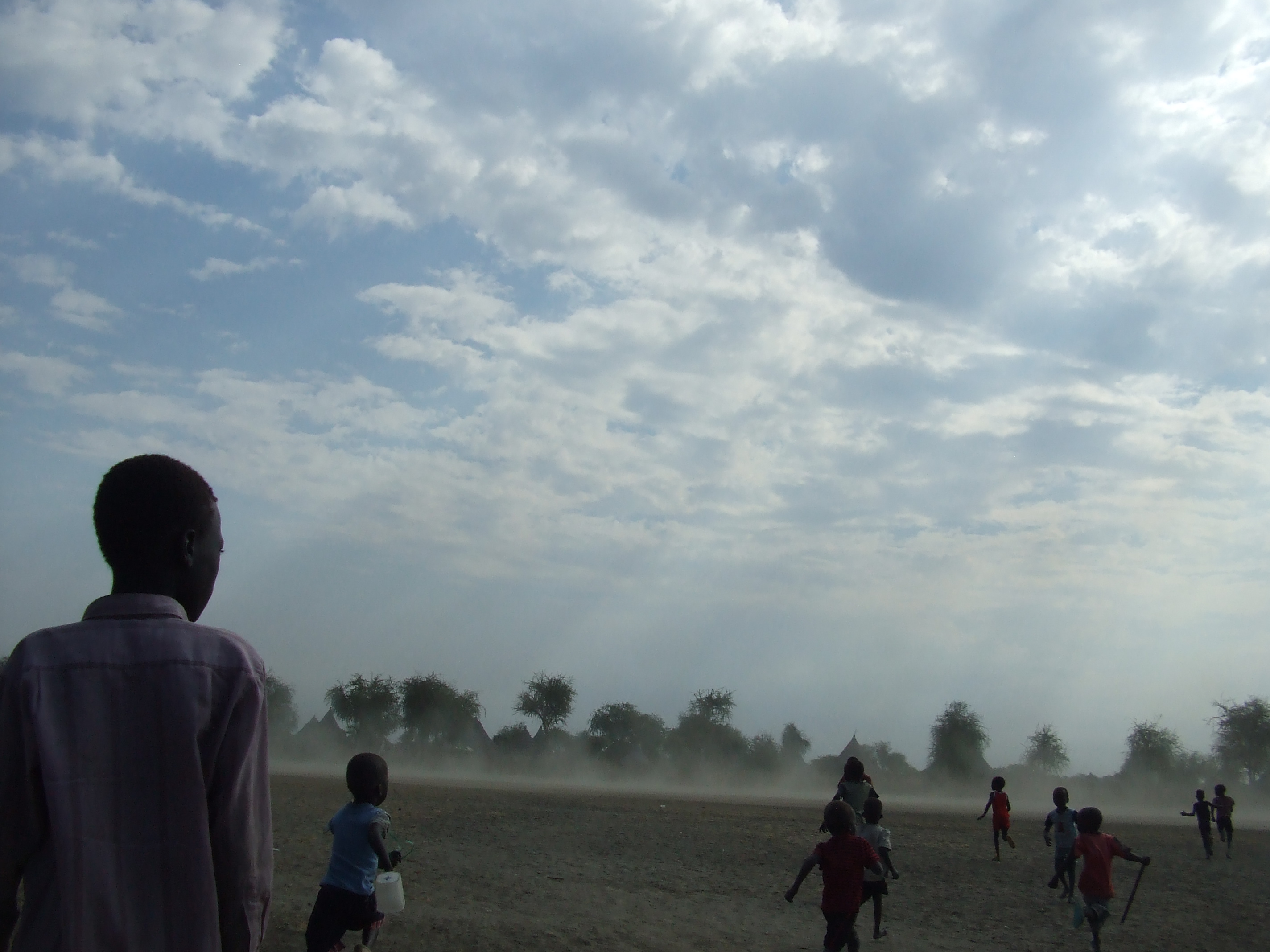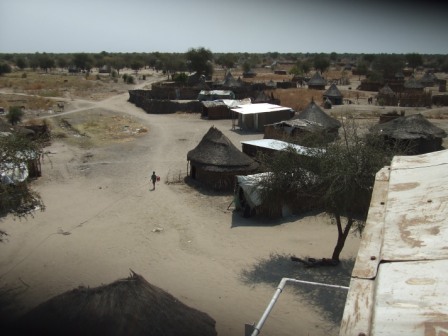In my blog, I have seldom yet taken the opportunity to actually talk about, or describe, the medical work we do here. I am slightly sceptical of emotive ‘aid images’, so have maybe shied away from too many ‘MSF t-shirts on doctors’ photographs. And in this sense, it has been good that images are so hard to email over the Satellite Phone Link here. For some reason with text there seems less chance for misinterpretation or misrepresentation. Call me old-fashioned, but I think the camera often lies. And I should know, having spent a career in Film and TV, creating these illusions which the viewers often do not realize are ‘posed’.
Morning is always the busiest time of day, when I have to organise my team, my daily workers, and the guards, as well as trying to get onto the shared computer to pick up any emails from the outside world. Today, though, Dr. Hanna offered to take me on her daily ward-round, and I decided to make some time. It was really grounding to be part of such an everyday routine, rather than the helter-skelter variety of Logistics.
The wards of Intensive Care Unit, Inpatient departments 1 and 2 (IPD1 and IPD2) are long barn-size buildings, made from sticks plastered with mud, but with corrugated zinc roves rather than the local thatch. Peoples’ personal belongings and food plates, as well as tribal accessories like sticks, robes, smoking-pipes (usually women), and water-gourds abound. There is an ongoing campaign to prevent food being cooked inside the wards. Yes, people have often lit fires on the cement floor between the beds, and still will try, if not watched. There is also the ongoing patrol, for which we have to employ a man full-time, to prevent open defecation around the outside of these wards.
So when you walk in, there is a smell which I can only describe as ‘Nuer’. It is something between the smell of a horse stable and good, clean tropical sweat. It is now a long time since I have really smelt it, as one becomes acclimatized quickly to the smells here. But I remember it hitting me well when I first arrived. The first person we meet is a woman with suspected Kala-Azar. Kala-Azar is a disease which only appears in developing countries. It has no value to western pharmaceutical companies, so comparatively little research has been done. I am not a medic, but from what I remember, it eats the body up from the inside-out. It attacks the immune/glandular system in the same way that HIV does, from what I can tell. I often see the results of it in its late stages as I am fussing around the oxygen machine, where the most boney living corpses you can imagine, lie on mats on the floor, hooked to the oxygen generator for survival.
Visually, these victims could put some of the hardest famine photography to shame, but remarkably many recover on the treatments of Ambisome and other drugs here. We are just coming to the end of an outbreak here in Lankien. I believe we may be the project with the biggest numbers left, here in Africa.
The next patient we see is one of the most dramatic in the hospital at the moment. She looks like a terrible leper, but in fact is the victim of a massive burn to her face. Although she looks ghastly, Hanna assures me that she is nearly healed, and has made a really good recovery. I get called away at this point, as somebody has asked me to fix the lights in IPD2 while I’m at it. I get my electrical hands, Malo onto it, show him how to test, how to use the multi-meter, and leave him to replace the necessary socket. When I catch up with Hanna, she is in the interim wards, a stained (but sanitary) trigano tent. This tent is one of my tents set-aside for ‘Sudden Influx of Wounded’ scenario, but is being used as a ward, not because we don’t have space – Kala Azar numbers are on the decline – but because people prefer to sleep in a tent, on the floor, rather than in formal hospital beds.
In this tent, from what I can see, are two patients and their families. I immediately spot one of the really fun children of IPD, who is always to be seen carrying her little brother around, and, with a friendly smile, introducing herself to ‘Kawais’ like me. We have a lot of fun, and I greet her. It turns out she is the daughter of the daughter of the patient, and old woman with a gangrenous leg. As we are visiting her, I get to touch her lower leg, which, just like those wax models you dare to touch as a kid in the London Dungeon, is just like wood. Or at least, the skin is just like cardboard. I heard and read a lot about the smell of gangrene when studying the history of medicine at school, and had smelt some new smell when I came through the flaps of the tent. She will be ‘greenlit’ out of here (flown on the plane), as we do not have an Operating Room in which to do the amputation. Despite the tent being old and stained, I have evaluated it closely, and have supervised chlorination, and the ‘ward’, with its mud floor covered in a plastic sheet, is actually a pleasant, clean, and relaxed area. I can see why some Nuer prefer it to the big ward. At least it’s not trying to be something it isn’t…
We see one other patient, and then Hanna walks over to a scrunched-up blanket on a mat in the corner. There is the most tiny, skinny, frail old woman under there! I had had no idea that she was there, and was relieved I hadn’t stomped over what I thought was the empty bed. At that point, I got called out again, to find that two of the three walls of a new Oxygen Room I am building were leaning and twisted like a snake.
That was my first experience of a regular ward-round. At night in most wards, the beds will be empty, with the patients who can move, going either under their beds (they fear the height from the floor!), or outside to sleep. Every morning, order is restored and the beds are re-occupied, but I remember the first time at night heading into IPD to check some light, and the place resembling a little festival – bodies lying around in the moonlight, low murmurings of patient and caretaker.
Evening found me sitting in the back of our expat compound with an African tribesman pressing a razor-blade against my jugular vein. This was not an abduction, or outbreak of clan violence which so often happens with spear, club, or AK47 in this part of Africa. Thomas Chuol Wiector, one of my finest carpenters, fabricators and, it has to be said, dandies, was giving me a ‘Nuer’. A haircut. At the start, I was thinking: ‘Hang on a minute, it feels like you’re just cutting along my head with the pair of paper scissors I just got for you from the office. Then I felt the back of my head, and found that to be exactly what her was doing. I had asked for a ‘trim’. I quickly resigned my self to the local buzz-cut, and am now actually really pleased with it. Like all things that are done well here, this was done extremely well.
It was just funny, looking forward, tilting your head, all the things you normally do at the barber except for the ‘Going anywhere nice on holiday this year?’ conversation. I chuckled silently as he walked round me, sizing-up what he had done, like the pro he is. A lizard scuttled across the mud wall of the Tukul in front of me. I looked at the chunks of hair on my lap that had been butchered from my scalp, and wondered for the umpteenth time at the bizzarreness of the evening, as he came at me one more time with the razorblade-on-the-back-of-the-comb, to finish off what transpired as a really good (really short!) short back and sides.

